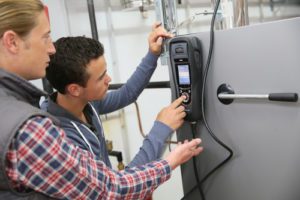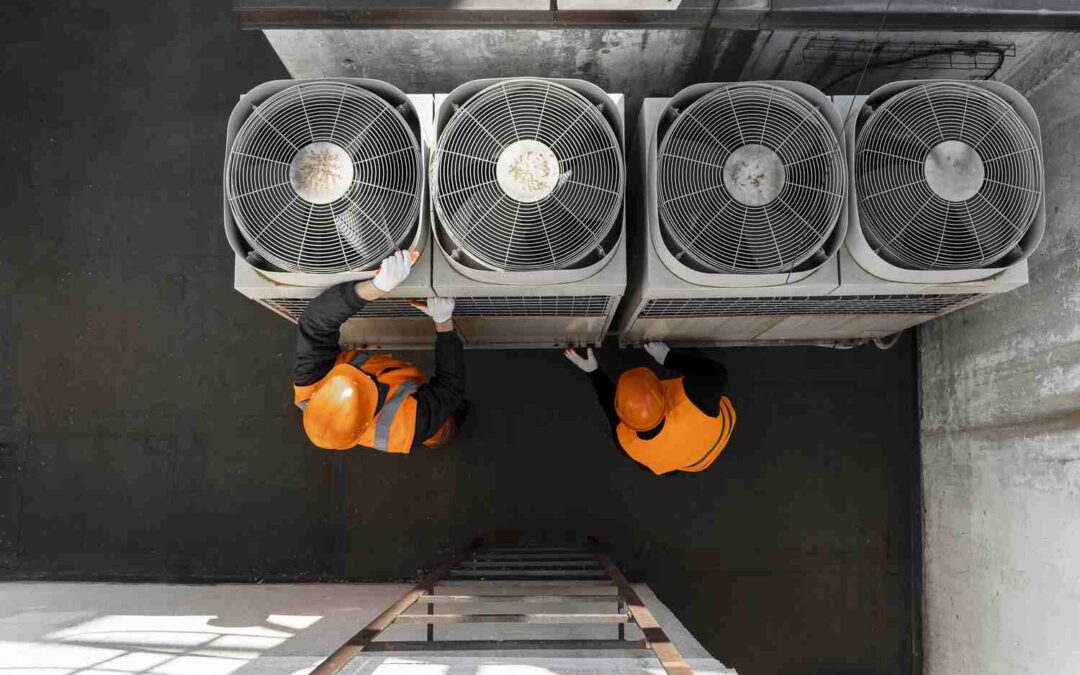Thinking about upgrading your home? You may currently want to add a new heating system to help you battle the winter months. Making a decision on whether to buy a heat pump or centralized unit system might be one of your concerns. Once you know the basics and how each system works, then you would be able to make that decision based on what it is you are looking for.
Heat pumps and centralized AC units work using the same concept but have some slightly different features that you should know of. They both distribute refrigerant between an indoor and outdoor system. Additionally, a series of coils that move air from one destination to the other operate within both systems. However there are a number of differences in the installation process. Heat pumps come in different types and sizes, but they tend to look similar to the centralized unit. Read on to find out how you can differentiate the two.
More Heat Pump Benefits
 The reserving benefit is the chief difference between the heat pump and the centralized air conditioner. Heat pumps can be used to either heat or cool your home. This added benefit is made possible mainly because the heat pump is able to transition from a heating to a cooling machine. Imagine having a system that can change the atmospheric conditions in your home to either hot or cold. Now that’s incredible and surely is a worthwhile investment. Your installation budget will help you decide on units that are affordable.
The reserving benefit is the chief difference between the heat pump and the centralized air conditioner. Heat pumps can be used to either heat or cool your home. This added benefit is made possible mainly because the heat pump is able to transition from a heating to a cooling machine. Imagine having a system that can change the atmospheric conditions in your home to either hot or cold. Now that’s incredible and surely is a worthwhile investment. Your installation budget will help you decide on units that are affordable.
Another difference is the drainage. For a centralized air conditioner, the unit is only able to eliminate added condensed moisture from the interior coil. Whereas, heat and moisture are extracted from the air within your home. In a heat pump system, condensation can happen along the outdoor coil during the heating setting. As a result, condensed moisture is extracted from the outdoor unit as well. If your temperatures are seldom below the 40’s during the winter season, the heat pump is the perfect heating solution for your home.
Even though, there is very little contrast between installing a centralized air conditioner and a heat pump. The specific features you may be looking for will determine your preference. A heat pump is more cost effective especially for those chilly winters that you might have to experience. Contact Valley Comfort Heating and Air Conditioning for more information on how we can help you stay warm this winter season.
Frequently Asked Questions
1. What is the main difference between a heat pump and central air system?
The primary difference is that heat pumps can both heat and cool your home, while central air conditioners only provide cooling. A heat pump reverses the refrigeration cycle, allowing it to extract heat from the outside and bring it indoors during the winter. On the other hand, central AC units only remove heat from inside your home, making heat pumps more versatile in climates that experience both warm and cold seasons.
2. Are heat pumps more energy-efficient than central air systems?
Yes, heat pumps are generally more energy-efficient because they transfer heat instead of generating it, using less electricity. According to the Department of Energy, heat pumps can reduce energy usage by up to 50% compared to electric resistance heating. This makes them an attractive option for homeowners looking to lower their energy bills year-round.
3. Can a heat pump handle extreme winter temperatures?
Heat pumps work best in moderate climates, but newer models with cold climate heat pumps can perform efficiently even in temperatures as low as -13°F. However, in areas with harsh winters, homeowners may need to pair a heat pump with a supplementary heating system, like a furnace, to maintain indoor comfort during extreme cold spells.
4. What is the cost difference between installing a heat pump and central air?
Installing a heat pump typically costs between $3,000 and $8,000, depending on the model and system size, while central air installation can range from $3,500 to $7,600. The initial cost of a heat pump might be higher, but the potential energy savings over time can offset the upfront cost, making it a more economical choice in the long run.
5. How does a heat pump’s lifespan compare to a central air unit?
Both heat pumps and central air conditioners have similar lifespans, typically lasting around 15 to 20 years with proper maintenance. However, since heat pumps operate year-round (for both heating and cooling), they may experience more wear and tear compared to a central AC system that’s only used seasonally for cooling.
6. Are there any tax credits for installing a heat pump?
Yes, installing a high-efficiency heat pump may qualify you for federal tax credits or state incentives. The U.S. government offers credits under the Energy Star program, allowing homeowners to receive up to $300 in rebates for energy-efficient heating and cooling systems. This can help reduce the upfront installation cost.
7. How do heat pumps impact indoor air quality compared to central air?
Heat pumps tend to provide better indoor air quality because they don’t rely on combustion, which can introduce pollutants into your home. Many heat pumps also come with built-in air filters that capture dust, pollen, and other allergens, making them a great choice for households with asthma or allergies.
8. What maintenance is required for heat pumps vs. central air systems?
Both systems require regular maintenance, such as cleaning or replacing air filters every 1 to 3 months and annual professional check-ups. However, because heat pumps operate year-round, they may need more frequent maintenance. Proper care can prevent breakdowns and extend the system’s lifespan.
9. Are heat pumps quieter than central air conditioners?
Yes, heat pumps tend to be quieter than central air systems, especially the newer inverter-driven models that adjust their speed based on the temperature. A typical heat pump produces noise levels between 40 to 60 decibels, which is quieter than many older central AC units.
10. Can you combine a heat pump with a furnace?
Yes, combining a heat pump with a furnace is known as a dual-fuel system. In this setup, the heat pump provides energy-efficient heating in milder temperatures, while the furnace takes over when it’s extremely cold. This approach offers the best of both worlds, ensuring comfort in a wide range of climates while keeping heating costs low..



